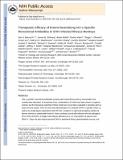Therapeutic efficacy of potent neutralizing HIV-1-specific monoclonal antibodies in SHIV-infected rhesus monkeys
Author(s)
Barouch, Dan H.; Whitney, James B.; Moldt, Brian; Klein, Florian; Oliveira, Thiago Y.; Liu, Jinyan; Stephenson, Kathryn E.; Chang, Hui-Wen; Shekhar, Karthik; Gupta, Sanjana; Nkolola, Joseph P.; Seaman, Michael S.; Smith, Kaitlin M.; Borducchi, Erica N.; Cabral, Crystal; Smith, Jeffrey Y.; Blackmore, Stephen; Sanisetty, Srisowmya; Perry, James R.; Beck, Matthew; Lewis, Mark G.; Rinaldi, William; Poignard, Pascal; Nussenzweig, Michel C.; Burton, Dennis R.; Chakraborty, Arup K; ... Show more Show less
DownloadChakraborty_Therapeutic efficacy.pdf (2.192Mb)
OPEN_ACCESS_POLICY
Open Access Policy
Creative Commons Attribution-Noncommercial-Share Alike
Terms of use
Metadata
Show full item recordAbstract
Human immunodeficiency virus type 1 (HIV-1)-specific monoclonal antibodies with extraordinary potency and breadth have recently been described. In humanized mice, combinations of monoclonal antibodies have been shown to suppress viraemia, but the therapeutic potential of these monoclonal antibodies has not yet been evaluated in primates with an intact immune system. Here we show that administration of a cocktail of HIV-1-specific monoclonal antibodies, as well as the single glycan-dependent monoclonal antibody PGT121, resulted in a rapid and precipitous decline of plasma viraemia to undetectable levels in rhesus monkeys chronically infected with the pathogenic simian–human immunodeficiency virus SHIV-SF162P3. A single monoclonal antibody infusion afforded up to a 3.1 log decline of plasma viral RNA in 7 days and also reduced proviral DNA in peripheral blood, gastrointestinal mucosa and lymph nodes without the development of viral resistance. Moreover, after monoclonal antibody administration, host Gag-specific T-lymphocyte responses showed improved functionality. Virus rebounded in most animals after a median of 56 days when serum monoclonal antibody titres had declined to undetectable levels, although, notably, a subset of animals maintained long-term virological control in the absence of further monoclonal antibody infusions. These data demonstrate a profound therapeutic effect of potent neutralizing HIV-1-specific monoclonal antibodies in SHIV-infected rhesus monkeys as well as an impact on host immune responses. Our findings strongly encourage the investigation of monoclonal antibody therapy for HIV-1 in humans.
Date issued
2013-11Department
Massachusetts Institute of Technology. Institute for Medical Engineering & Science; Massachusetts Institute of Technology. Department of Chemical Engineering; Ragon Institute of MGH, MIT and HarvardJournal
Nature
Publisher
Nature Publishing Group
Citation
Barouch, Dan H., James B. Whitney, Brian Moldt, Florian Klein, Thiago Y. Oliveira, Jinyan Liu, Kathryn E. Stephenson, et al. “Therapeutic Efficacy of Potent Neutralizing HIV-1-Specific Monoclonal Antibodies in SHIV-Infected Rhesus Monkeys.” Nature 503 (14 November 2013): 224-228.
Version: Author's final manuscript
ISSN
0028-0836
1476-4687